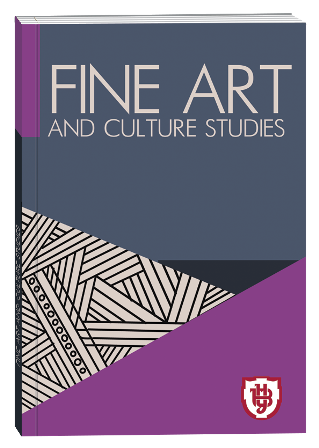INNOVATIVE TECHNOLOGIES IN THE PROCESS OF INSTRUMENTAL TRAINING OF COLLEGE STUDENTS: TESTING OF AUDITING SKILLS
DOI:
https://doi.org/10.32782/facs-2024-5-5Keywords:
innovative technologies in music education, auditory skills, testing of auditory skills, artificial intelligence, online platforms, AIAbstract
The process of informatization of music education is now at a stage of intensive growth. New information technologies, arising as a result of the general process of informatization of society, are increasingly used in the educational process in the teaching of various musical disciplines. Scientific novelty. An important role in the organization of the modern educational process is played by new information technologies in the process of selection, accumulation, systematization and transfer of knowledge. The new technological and methodical possibilities provided by them are a priority in the developed methods of control and testing of students’ knowledge and skills. Innovative pedagogical technologies today are largely associated with the introduction of computers, electronic communication tools, artificial intelligence, online platforms and resources into education. The need to use new information technologies in all spheres of life is dictated by the development of our society. Modern music education should not lag behind the requirements of the time, and therefore, the teacher should use computer technologies in his activities, receiving a powerful stimulus for his own professional and creative development, improving the quality of education. Many computer technologies are focused on the individual nature of the work, which corresponds to the specifics of music lessons. Methods. To achieve the goal, the following methods were used: substantiation, generalization, systematization of theoretical and practical material. The purpose of the work. An important aspect of music education is the testing of students’ auditory skills, and it is precisely in this matter that innovative technologies and artificial intelligence occupy a special place. The main goal is to define and outline the main forms and methods of accurate assessment of the listening abilities of a student-musician, based on which in the future to develop an individual program of classes aimed at improving listening skills. The article raises the question of the possibilities of using innovative technologies for testing and improving auditory skills in music education of musicians. The conclusion states that new trends and cutting-edge innovations contribute to the formation of a well-defined algorithm for testing auditory skills, which radically changes the ways of learning future student musicians. Technological progress does not just introduce new things, but also contributes to the transformation of traditional music technologies in education. Updating the usual way of assessing the listening skills of music students opens up a number of opportunities for creative implementation by the teacher: the teacher can record «samples of executive activity», which he then demonstrates to the students, uses the educational technology of online sparring in his work with them; allows you to conduct a lesson online, using innovative multimedia tools and software and methodical support of music information technologies; creates conditions for a creative approach to the implementation of the educational process and formation of the future specialist. However, it is necessary to understand that advances in information technology only help in the educational process, but cannot replace professionalism, which is built on deep knowledge of tradition. All this proves that the introduction of effective methods, organizational forms, types of training, modern means and technologies of individual training of a studentmusician contributes to the transformation of the traditions of musical education, the improvement of the educational process and the formation of professionals of the highest level, which means the development and improvement of the level of personal culture and, as a result, academic musical culture as a whole.
References
Воронова Н.С. Мультимедійні технології в освіті. 2018. URL: https://fitu.kubg.edu.ua/images/stories/Departments/kitmd/Internet_conf_17.05.18/s1/1_Voronova.pdf (дата звернення: 25.07.2024).
Го Р., Дін Дж. і Занг В. Реформа музичної онлайн-освіти та оптимізація бездротової мережі з використанням штучного інтелекту для навчання піаніно. Бездротовий зв’язок і мобільні комп’ютери, 2021, 6456734. https://doi.org/10.1155/2021/6456734.
Інформаційно-комунікаційні технології для педагогічних працівників (Практичний курс), укл. Д. А. Покришень, Є. С. Закревська, О. М. Корнієць, Ю. М. Літош, В. М. Ракута, О. О. Тихоненко. Чернігів: ЧОІППО імені К. Д. Ушинського, 2011. 62 с.
Листопад О.В. Інноваційний розвиток освіти й освітні інновації. Понятійно-термінологічний аналіз проблеми. Інновації у професійно-педагогічній підготовці майбутнього вчителя: методологічні, змістові та методичні аспекти : моногр. за ред. проф. А.А. Сбруєвої. Суми : МакДен, 2011. С. 43–60.
Попович Н. М. Проблема інтеграції інформаційно-комунікаційних технологій у систему професійної підготовки майбутнього вчителя музики. Інформаційні технології і засоби навчання. 2013. № 1 (33). URL: http://journal.iitta.gov.ua (дата звернення: 26.07.2024).
Ройтенко Н. О. Концептуальні засади педагогічного супроводу вокального розвитку майбутніх учителів музичного мистецтва. Наукові записки. Серія: Педагогічні науки, 2017. Вип. 155. С. 101–104.
Ху Ю. Прикладне значення системи штучного інтелекту в музичній освіті. 2021 р. 4-та Міжнародна конференція з інформаційних систем та комп’ютерної освіти (стор. 1459–1462). ACM. https://doi.org/10.1145/3482632.3483173.







